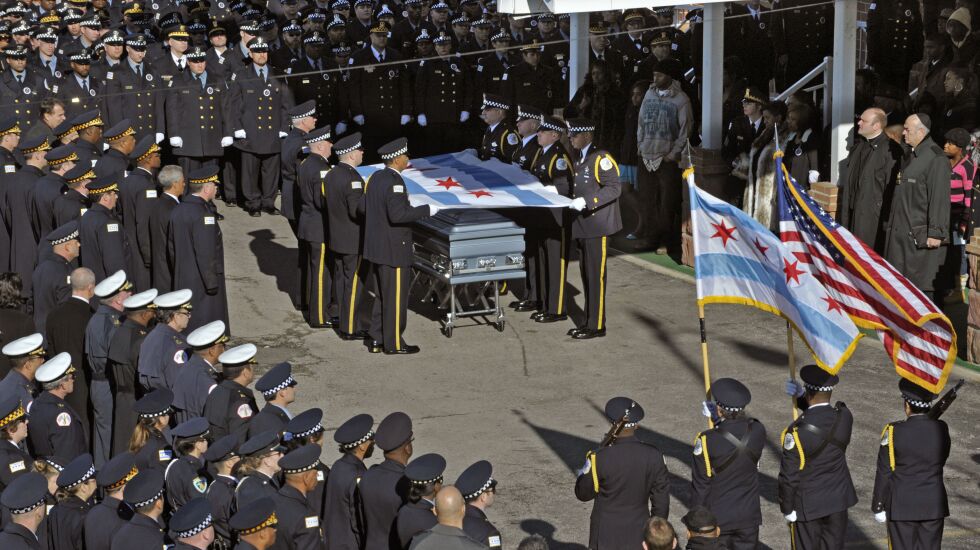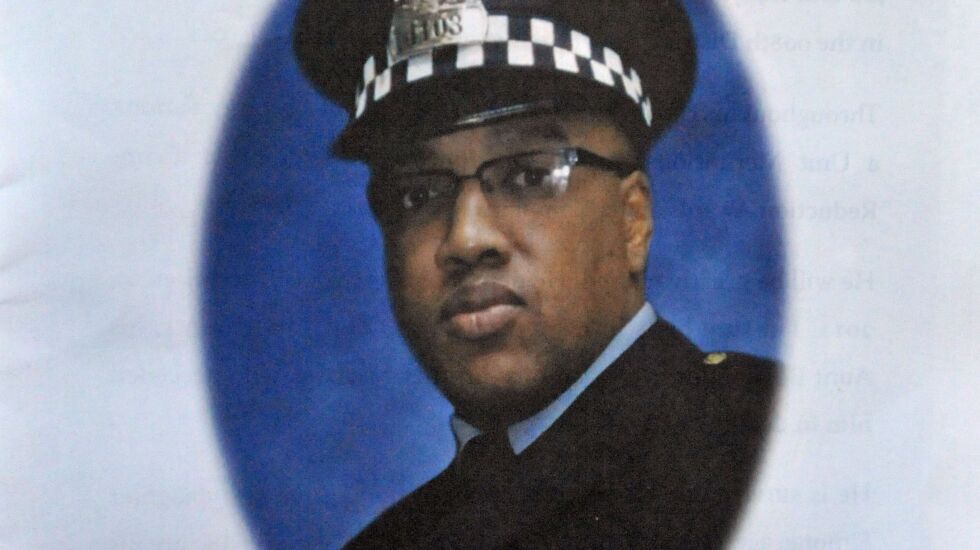
Alexander Villa, convicted as one of the gunmen in the murder of Chicago police officer Clifton Lewis, was sentenced to life in prison Monday but vowed to appeal his verdict and maintained he was framed by police and prosecutors.
“First and foremost, my condolences go out to the Lewis family, but I’m not the person that did this,” Villa, 35, said as he stood at the defense table, facing a courtroom that was half-filled with his family and supporters, and half with Lewis’ family and uniformed CPD officers.
“I will fight this to the appellate court, I will fight this in the Supreme Court, but I know where I will never have to fight this. That’s in God’s court. He knows I’m innocent.”
The sentencing hearing comes nearly four years after Villa was convicted of gunning down the off-duty Lewis during a 2011 armed robbery of a convenience store in the West Side’s Austin neighborhood, and just weeks after prosecutors dropped all charges against his two co-defendants ahead of a hearing on allegations of misconduct by prosecutors and detectives working on the case.
In the courthouse lobby after the hearing, Lewis’ three sisters said Villa’s sentence gave the family closure after more than a decade. Lewis had a daughter and had proposed to his longtime girlfriend, Latrice Tucker, on Christmas morning 2011, just days before he was killed.
Tucker, who never married, died of cancer in June. Her wake took place the day prosecutors announced they were dropping the cases against alleged getaway driver Edgardo Colon and Tyrone Clay, charged as the second gunman in the fatal robbery. In court on Monday, Assistant State’s Attorney Kevin DeBoni read aloud a letter Tucker had written before her death.
“It was like she was there in the courtroom with us,” Lewis’ sister Lashana Lewis told reporters. “She loved my brother dearly. ... We know they are together now, and they are loving on each other.”
The prosecution of the three men charged with Lewis’ murder has been troubled. Both Clay and Colon had confessed after lengthy interrogations — and after they had repeatedly asked for a lawyer. The confessions, and alleged statements they made in front of witnesses, had formed the bulk of the evidence against all three.
Colon was convicted by a jury in 2017 and sentenced to 84 years, and was several years into that sentence when an appellate court ruled his confession was inadmissible, and he was granted a new trial. Some 10 years after his arrest, Colon was freed on bond while awaiting a second trial. Clay spent 12 years locked up and had not made it to trial, his case delayed by appeals of a judge’s ruling tossing out his confession, as well.
Asked if she was troubled by the decision to drop the charges against Clay and Colon, and Villa’s statement in court that he had been framed for Lewis’ murder, Lashana Lewis said she was confident justice had been served.
“I didn’t think nothing of it, I didn’t feel anything. I know there are no mistakes made,” she said. “Everything that was brought forth in court was brought forth for a reason, and we have our God.”
Villa’s hourlong sentencing hearing came after more than a decade of litigation, including the last two years, during which lawyers who took on Villa’s appeal tried several tactics to overturn the verdict. Judge James Linn, who presided over Villa’s trial in 2019, on Friday had denied a request by Villa’s lawyers to grant him a new trial. Earlier this month, another judge denied Villa’s motion to assign a new judge to the case, and last week, Linn denied a motion to appoint a special prosecutor to review the handling of the case.
The new set of lawyers handling Villa’s sentencing had subpoenaed a batch of records and requested still more CPD files. Villa attorney Jennifer Blagg described those records as a “treasure trove” of evidence that detectives had hidden from Villa’s trial team — information showing all three men were innocent.
Linn referenced Blagg’s lengthy briefs seeking a new trial — three motions, each longer than 100 pages, each alleging new categories of missing evidence — but said the records he reviewed would not have changed the outcome of Villa’s trial.
Blagg said a map the FBI created using cellphone data shortly after the shooting showed Villa, Colon and Clay were not at the scene when Lewis was shot, but that map was never turned over to Villa’s trial attorney, and the data used to create the map was subsequently lost by CPD.
In the months after Lewis’ death, a joint CPD-FBI dragnet dubbed by police as “Operation Snake Doctor” led to more than 100 arrests targeting Villa and members of the Spanish Cobras gang, but records from the probe were kept separate from the Lewis murder investigation and never provided to the defense, Blagg said.
Last fall, Judge Erica Reddick, who presided over Colon’s and Clay’s cases, had ordered a sweeping dump of records related to Snake Doctor and other purportedly missing evidence in the cases before her.
In June, Reddick had set a hearing where detectives and prosecutors who had handled the case from its earliest days were subpoenaed to testify about the allegations of misconduct. Charges were dropped the morning of the hearing, with DeBoni saying at the time that the State’s Attorney’s Office did not “believe it could meet it’s burden (of proof) at trial,” based on issues with the case other than those raised by Clay and Colon’s allegations.
At Monday’s sentencing, Linn noted the massive set of Snake Doctor files he reviewed included evidence of other crimes that would have had a negative impact on his sentence — except that Villa already faced a mandatory life term because of the conviction on the first-degree murder charges.
In the courthouse lobby, Blagg noted Villa’s co-defendants, Clay and Colon, both confessed after lengthy interrogations — confessions ultimately tossed out by judges — and had gone free. Villa, arrested days after the murder, refused to confess, was released and wasn’t charged until nearly two years after the shooting.
Security video from inside the convenience store was played repeatedly for the jurors at Villa’s trial, showing two gunmen bursting into the store and firing at Lewis, who ducked behind a counter after returning fire. One man, identified as Villa, leapt over the counter and shot Lewis multiple times before taking the officer’s gun. Lewis lived near the store and had taken a job there as a security guard to make extra money for his wedding.








